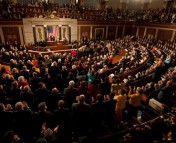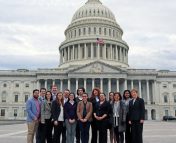March 29th — the day that the UK leaves the EU — is fast approaching, but still nobody seems clear on exactly what is going to happen. As a British PhD student in the UK, I am naturally concerned about the impact that Brexit will have on research. I participated in an EU-funded masters programme, and now attend conferences abroad and share an office with researchers from across Europe and beyond. So how will Brexit affect science — and astronomy in particular?
Money matters
While the UK may be a net contributor to the EU budget, we receive a disproportionately large share of EU research funding relative to the amount we pay in — so Brexit will result in a net loss to UK science funding. As the British economy undoubtedly takes a hit and the pound tumbles, our national science budget will be stretched and competition for grants will become fierce. Curiosity-driven, fundamental research such as astrophysics is likely to suffer as priorities favour impact-driven, more profitable science.
More importantly, leaving the EU cuts us out of the shared funding that is crucial given the collaborative nature of scientific, and especially astrophysical, research. Horizon 2020 is the EU’s ∼€80 billion research and innovation initiative, funding some of the largest projects in European science. Grants are awarded to international consortia, allowing researchers from across the EU to connect and participate in large-scale projects.
With access to such programmes cut off, the UK will be left out of the world-leading collaborations that steer Europe’s astronomical research. The government have pledged to underwrite existing Horizon 2020 funding post-Brexit, and it is possible that some special arrangement will be made allowing UK researchers to participate in Horizon 2020 collaborations. For the moment the future is uncertain, and that uncertainty has already had an impact. There are numerous examples (see here, here and here) of UK researchers being overlooked or asked to step down from proposals already, due to doubts about the post-Brexit future of these collaborations and concerns about discrimination in evaluating grant proposals. Figure 1 shows that since 2015, there has not only been a decline in funding available for UK research, but also the number of UK-based projects and project coordinators in Horizon 2020 programmes. This is despite the fact that the UK’s participation in Horizon 2020 has not yet officially changed — these effects will likely be amplified as Horizon 2020 ends and the subsequent Horizon Europe programme begins. Switzerland provides a cautionary tale: their participation fell by 40% when they canceled their freedom of movement agreement with the EU in 2014.
Freedom to move
One of the biggest impacts that leaving the EU will have on UK research is that it will restrict the movement of researchers from country to country. Currently, a third of post-doctoral astrophysicists in the UK are EU nationals, making up a significant fraction of the workforce behind research that ranks 3rd in the world. Brexit will place these EU researchers in the same category as other international researchers are at present, facing a bureaucratic barrier of visa applications before being allowed into the country. Even if researchers are granted skilled worker status (a situation which is still unclear, as the current model has an income threshold above that of many post-doc salaries), their partners and families may be denied entry or have unrealistic visa fees to contend with.
Being able to work and travel internationally is fundamental to astrophysical research, with conferences, collaborations and sabbaticals creating the context for cutting-edge ideas to be communicated and built upon. Internationally co-authored papers are more highly cited, and modern astrophysical research facilities such as ALMA and the SKA are only possible thanks to global partnerships. EU research accounts for over a third all of scientific output worldwide, and facilitates networking not just between member states but on global scales. By making these opportunities more difficult or even impossible, the UK’s astrophysics research output will be stifled.
Again, the uncertainty of Brexit has already taken its toll. EU nationals currently working in the UK have expressed fear over their futures, and it is becoming clear that a job offer from a UK institution is seen as more precarious than one safely in the EU. UK universities will lose access to a pool of talented researchers, who do not want to risk their futures in a post-Brexit Europe.
Losing our voice
The impact mentioned so far is largely on policy for science: however, Brexit will also impact our contribution to science for policy, an idea explained in our policy guide. By leaving the EU and its research programmes, we exclude ourselves from shaping the future of European research. Regardless of whether UK researchers actively participate in them, international programmes facilitated by the EU will be the driving force of scientific research in Europe. We will lose our voice and power to contribute to EU policy on topics such as biomedical ethics, privacy and data protection, and climate change — despite the fact that we will likely have to adopt the same policy in order to allow international collaboration to continue at all.
These are a few of the challenges that UK science and astrophysics will face. Although the full scale of the consequences of leaving the EU may be hard to anticipate, the effects of the present uncertainty and doubt should not be underestimated. Despite the exact course of Brexit still being unclear, it has already made its mark on the UK research community.
If you are interested in finding out more, check outScientists for EU — a campaign by UK scientists to keep the UK in the EU.



